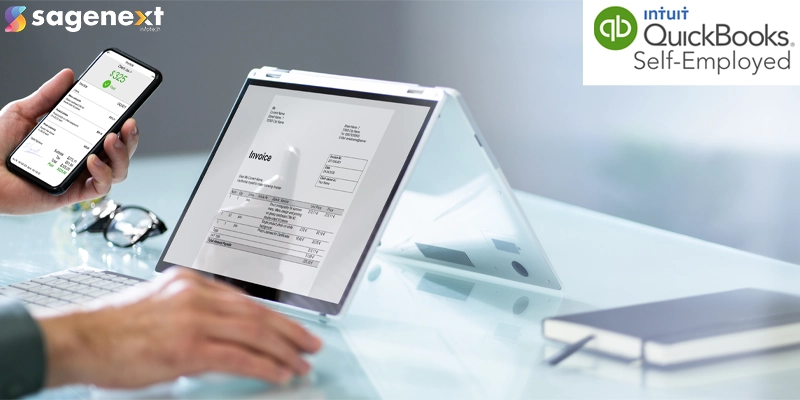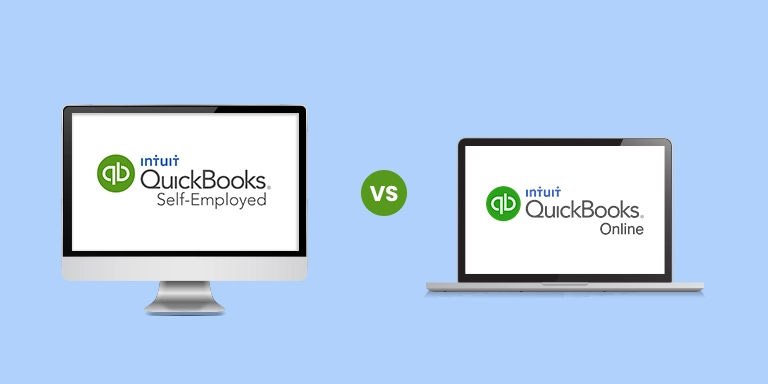
QuickBooks Self-Employed 2025: Simplify Your Employment Journey
The QuickBooks Self Employed user base has surged, experiencing a remarkable twofold increase to reach 360,000 users. This growth is notably higher than the preceding quarter’s count of 180,000, and it marks a substantial leap from the count of 75,000 merely a year ago. It can be attributed to an innovative integration between QuickBooks Self-Employed and TurboTax that has resulted in almost 4 million self-employed individuals utilizing the service for tax filing purposes.
What is QuickBooks Self Employed

QuickBooks Self-Employed is a cloud-based accounting software tailored for freelancers, sole proprietors, and individual contractors.
It’s empowers self-employed individuals to take control of their finances with its powerful accounting tool. Entrepreneurs can easily manage their income and expenses, track mileage, send invoices, and pay taxes online using this software. It also categorizes expenses and tracks deductions to help them stay organized.
The software’s advanced analytics provide insights into future cash flow and tax liability, enabling business owners to make informed decisions quickly and accurately. Additionally, users can access all their financial information from any device at any time, making QuickBooks Self-Employed the ideal choice for those who need to manage their businesses efficiently while constantly on the move.
Key Features or Benefits of QuickBooks Self-Employed
- Bank Connectivity: QuickBooks Self-Employed allows users to connect their bank accounts directly to the software, so they can quickly and easily manage their financial transactions in one place.
- Mileage Tracking: Users can track their mileage for tax purposes with just a few clicks using this feature. They can also categorize trips as business or personal for better tracking accuracy.
- Automated Tax Calculations: QuickBooks Self Employed includes tax calculations so that users can see how much they owe in taxes at any given time throughout the year. This helps them stay organized and compliant with the IRS at all times.
- Invoicing: Users can easily create professional invoices on the go from their phone or laptop using this feature, then send them out directly from QuickBooks Self Employed via email or text message in just a few minutes.
- Financial Reporting: With the reporting feature, users can easily generate reports on their income and expenses over any period of time.
How to Get Started With QuickBooks Self-Employed
- Start by setting up your QuickBooks Self-Employed account. You can do this by visiting the QuickBooks website “https://quickbooks.intuit.com/self-employed/” and signing up for a new account.
- Once your account is set up, connect your bank accounts and credit cards to QuickBooks Self-Employed. This will allow the software to automatically import your financial transactions.
- Categorize your expenses and income: QuickBooks Self Employed offers pre-set categories, but you can also create your own custom categories. Make sure to accurately categorize your transactions for accurate reporting and tax purposes.
- Use the invoicing feature to create and send professional invoices to your clients: You can customize the invoice template with your logo and branding, and easily track when payments are due.
- Track your mileage using QuickBooks Self Employed mileage tracking feature: This is especially useful for self-employed individuals who need to deduct their business mileage for tax purposes.
- Generate reports and analyze your business’s financial health: QuickBooks Self Employed offers a variety of reports, including profit and loss statements, expense reports, and tax reports.
- Utilize the tax features in QuickBooks Self-Employed: The software can help you estimate your quarterly tax payments and track your deductible expenses, making tax time a breeze.
- QuickBooks Self-Employed mobile app: QuickBooks Self Employed has a desktop version as well as mobile application (app) that allows you to manage your finances on the go.
- Integrating QuickBooks Self-Employed with other tools and software you use: QuickBooks Self Employed offers integrations with popular platforms like Shopify, PayPal, and Square, allowing you to streamline your business processes.
Advantages and Disadvantages of QuickBooks Self Employed
| Advantages | Disadvantages |
|---|---|
| Simplicity and User-Friendly Interface | Limited Functionality for Larger Businesses |
| Efficient Expense Tracking | Restricted Integration Options |
| Streamlined Invoicing and Payment Management | Subscription Pricing Concerns |
| Simplified Tax Preparation | Scalability Challenges |
| Automated Mileage Tracking | Lack of Double-Entry Accounting |
QuickBooks Self Employed Vs Online

QuickBooks Self-Employed is designed for freelancers and independent contractors, while QuickBooks Online is a comprehensive accounting solution for small businesses.
| Product | QuickBooks Self-Employed | QuickBooks Online |
|---|---|---|
| Best For | For Freelancers and Single Business owners | For Small Business Owners/SMBs |
| Price | 20$/month | Starts at 35$/month |
| Number of Users | 1 | 1-30 |
| Features |
|
|
| Integrations |
|
|
| Customer Support | Email & Phone Support | Email, Phone & Chat Support |
Gain Access to Manage Your Finances and Hassle-free Tax Filing
QuickBooks Self Employed Vs Simple Start
QuickBooks Self-Employed is tailored for freelancers and self-employed individuals seeking simple expense tracking, invoicing, and tax preparation tools.
On the other hand, QuickBooks Simple Start is suitable for small businesses requiring more advanced features, including comprehensive expense management, invoicing, tax reporting, and scalability as the business expands.
| Feature | QuickBooks Self-Employed | QuickBooks Simple Start |
| Price | 20$/month | 35$/month |
| Number of Users |
1 | 1-2 |
| Features | Basic Bookkeeping Tools | All Features of QuickBooks Self-Employed, Plus Additional Features |
| Integrations | TurboTax Self-Employed, Stripe, PayPal & QuickBooks Payments | Shopify, Xero, Stripe, PayPal |
| Customer Support |
Email & Phone Support | Email, Phone & Chat Support |
Take control of your finances today with QuickBooks Self-Employed
Top 7 Alternatives for QuickBooks Self Employed
Self-employed individuals and freelancers seeking an alternative to QuickBooks Self-Employed have a variety of alternatives available. Some popular choices include
- FreshBooks: Designed with the needs of freelancers and small business owners in mind, FreshBooks is an accounting software that offers features such as invoicing, expense tracking, time tracking, and basic financial reporting.
- Wave: A free accounting software, Wave provides essential features like invoicing, expense tracking, and basic accounting functions. It is particularly suitable for small businesses and freelancers who need a simple yet cost-effective solution.
- Zoho Books: Zoho Books offers a comprehensive suite of tools, including invoicing, expense tracking, time tracking, and basic accounting features. It seamlessly integrates with other Zoho business software products.
- HoneyBook: Creative freelancers and service-based businesses use HoneyBook, which offers tools for client communication, project management, invoicing, and payment processing.
- AND.CO: Freelancers and small businesses rely on AND.CO for its invoicing, expense tracking, time tracking, and contract management capabilities. It is renowned for its streamlined interface and user-friendly nature.
- Sage Business Cloud Accounting: Freelancers and small businesses can access invoicing, expense tracking, and basic accounting features through Sage Business Cloud Accounting, previously known as Sage One.
- Bonsai: Freelancers benefit from Bonsai, a platform that provides tools for contracts, proposals, invoicing, time tracking, and expense management.
Also Read: Complete Guide to Sage Accounting Software
QuickBooks Self Employed Accounting Software Review 2024
Before you finally decide which software to use for your accounting purposes, see the reviews provided by various trusted websites:
Reviews by TrustRadius

Reviews by Software Advice

Steps to Migrate and Upgrade from QuickBooks Self-employed to QuickBooks Online
Step 1: Save your financial reports
Download all your work from QuickBooks Self-Employed so you have an extra copy for safekeeping.
- Go to Reports.
- From the Tax Details section, select a tax year.
- Select Download.
- Download a report for each year you have in QuickBooks.
- Repeat these steps for your Profit and Loss, Mileage Log, and Receipts.
Step 2: Copy your data to QuickBooks Online
If you copy your data to QuickBooks Online, there’s no way to return to QuickBooks Self-Employed. If you still want to copy it, follow these steps on a computer.
- Go to Settings, then from the Profile column, select Upgrade.
- Select Choose a plan on the one that you prefer.
- Review the changes in features, then select Sounds Good.
- If you want to copy your data to QuickBooks Online, select Bring My Data. If not, select Start Fresh.
Note: If you choose to bring your data, follow the steps to categorize open transactions and mark the paid invoices.
- Review the summary of data that you’ll move to QuickBooks Online.
- Select Continue, then To QuickBooks Online!
- Double-check your payment method, then select Change plan. If you need to change your payment method, select Edit.
- Answer or confirm a few details about your business to start using QuickBooks Online.
Conclusion
QuickBooks Self-Employed is a dependable partner throughout your journey as a self-employed individual. It not only provides efficient financial management but also brings peace of mind.
When venturing into the world of entrepreneurship, it is wise to embrace QuickBooks Self-Employed as your trusted ally in streamlining and enriching your self-employment experience.
Frequently Asked Questions
Can I have more than one business on QuickBooks Self-Employed?
No, One QuickBooks Self-Employed/QuickBooks Online account is for one company file. You must sign up for a new QBSE account with another email address to proceed.
How does QuickBooks Self Employed differ from other QuickBooks versions?
QuickBooks Self-Employed is specifically designed for individual use and can only be accessed by one user. On the other hand, QuickBooks allows for multiple users, which makes it more suitable for small businesses that operate as a team.
Can I add my Bookkeeper, Accountant, or tax professional?
Certainly! It is possible to extend a complimentary invitation to an accountant for collaboration. Upon accepting the invitation, they will have the ability to work on your account. You retain the option to revoke their access at any given time.
How much does QuickBooks for self-employed cost?
QuickBooks for Self-Employed has three pricing plans:
- Basic Self-Employed: $15 per month
- Self-Employed Tax Bundle: $25 per month
- Self-Employed Live Tax Bundle: $35 per month
 written by
written byAbout Author






